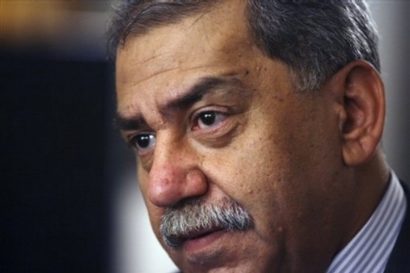Former Iraqi parliamentarian says most Iraqis support Soleimani assassination
by Heather Robinson


Mithal al-Alusi says most Iraqis “are very happy” about the assassination of IRGC Maj. Gen. Qassem Soleimani.
Mithal al-Alusi, former Iraqi parliamentarian and a longtime friend of Israel, said in a phone interview on Monday that he supports U.S. President Donald Trump’s decision to assassinate Qassem Soleimani, the leader of Iran’s Quds Force, a branch of the Islamic Revolutionary Guard Corps (IRGC) responsible for terrorist operations outside of Iran. He added that he believes the majority of Iraqis are “very happy” about the assassination.
“Soleimani did kill many Americans, many Europeans, many Jewish [people],” Alusi told me. “Maybe more than [ISIS leader Abu Bakr al-] Baghdadi and maybe more than [Al-Qaeda head Osama] bin Laden. He was a very high level—the highest-level international terrorist.”
Alusi, who served three terms in Iraq’s parliament as head of the Iraqi Nation Party—a classically liberal political party that championed human rights, rule of law, a free press, and normalized relations between Iraq and Israel—knows the horrors of terrorism firsthand. In February 2005, terrorists murdered his two sons, Ayman, 30, and Jamal, 22, as payback for their father’s decision to visit Israel to attend a counterterrorism conference.
Refusing to be intimidated, Alusi remained in Iraq and served in the parliament for more than a decade. Throughout his three terms, he continued to travel to Israel periodically, and to support normalized relations between Iraq and Israel, despite at least one unsuccessful assassination attempt against him.
Alusi declined to run for a fourth term in a parliament that he says has been mostly corrupted by Iran via intimidation and bribery of Iraq’s politicians. He knows this, he says, because Iranian officials offered him large sums of money to advance Iran’s interests while serving in Iraq’s parliament, which he refused to do.
Despite the outwardly show of opposition to the strike against Soleimani during the past two days, including Iraqi Prime Minister Adil Abdul-Mahdi’s recommendation to Iraq’s parliament that U.S. troops leave the country, and a nonbinding vote in Iraq’s parliament on Sunday to expel the thousands of U.S. troops stationed there, Alusi says most Iraqis—the silent majority, he believes—“are very happy” about the assassination of Soleimani. He added, “Officially, I am happy and thanking Mr. Trump.”
“Watch our Twitters, watch our Facebook” to see the supportive reaction to the assassination, says Alusi. “I wouldn’t say everyone, [but in general] we are so happy, directly or indirectly. … Many Iraqis are poor and can’t face the militias, but they are saying [privately] they are very happy.”
One reason that many Iraqis are happy, Alusi explained, is that they know Soleimani oversaw the violent crackdown against Iraqi protesters who took to the streets in recent months to protest government mismanagement and Iran’s interference in Iraq’s government. Since October, 500 Iraqis have been killed at rallies, with as many as 25,000 injured.
“Twenty-five thousand, plus 500 killed,” Alusi said by way of explaining Iraqis’ outrage towards Soleimani who, as director of the Quds Force, was in charge of military and terrorist operations overseas, including the brutal crackdown against the protesters. “How many tribes [in Iraq] are connected with these people [who were injured or killed]? How many are really happy Soleimani doesn’t exist anymore?”
In November, Israel’s Foreign Minister Israel Katz expressed public support for Iraqi protesters, tweeting for their “freedom & dignity” and condemning the brutality of the IRGC in suppressing the demonstrations, decrying Qassem Soleimani by name.
“We Iraqis did hear five or six Israeli statements from [Israel’s] state department, the [Israeli] Foreign Ministry and Netanyahu personally. They said, ‘We are with you free Iraqis, and we want Iraq to be free of Iranian terrorists and militias,’ ” reported Alusi. “Iraqis reacted very happily, immediately to this Israeli position. Maybe 5 percent reacted in a bad way, but the majority liked it.”
As evidence, Alusi cited examples of Iraqi citizens’ expressions of gratitude towards the Israeli government on Facebook and Twitter.
Asked what most Iraqis think of Israel, Alusi said, “Reality is, Iraqis understand ‘the enemy of my enemy is my friend.’ Iran is the enemy of Israel, so for many Iraqis, Israel is our friend. They are facing the same danger,” he said.
Asked if he believes that the assassination of Soleimani will prompt terroristic reprisals from Iran, Alusi said it very well might. But he added that Iran’s proxies are already engaged in attacks against innocent civilians in many places and have been for many years.
“It’s an old story,” he said. “Hezbollah attacking Israelis or [Iranian-backed] militias killing Iraqis; they can make chaos.”
He thinks it’s unlikely that Iran’s proxies would target citizens in the United States because “they know they can’t win a war against America.”
He also said he was in possession of intelligence that Iran planned a large-scale strike against U.S. forces in Iraq in the near term, intended as a distraction “to create chaos in the Mideast, make Americans busy [and] to win time to produce an Iranian nuclear bomb.”
For that reason and others, Alusi says, he has been in favor of a strike against Soleimani for a long time.
And he believes that it’s the right time to promote Iraqi and Israeli contact and cooperation.
Alusi has been at the forefront of such bridge-building, receiving the American Jewish Committee’s Moral Courage Award in 2005, and last year, the AJC’s Jan Karski Award, named for the renowned Polish diplomat who sought to focus world attention on the Nazis’ abuse of Jews during the Holocaust.
“Now is the time to push these societies” to promote greater contact, especially among youth, he said, “because both sides want to live safely.”
This entry was written by Heather Robinson and posted on January 8, 2020 at 12:59 am and filed under Features. permalink. Follow any comments here with the RSS feed for this post. Keywords: . Post a comment or leave a trackback: Trackback URL. */?>



